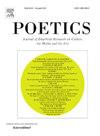中心与边缘:解读欧洲图书翻译流动的宏观结构
IF 1.7
2区 社会学
0 LITERATURE
引用次数: 0
摘要
本研究分析了国与国之间的图书翻译交流。现有的研究在翻译流是否受文学、经济、政治或文化因素驱动的问题上存在分歧。因此,将国家划分为中心和边缘的力量受到了争论。为了推进这一争论,本研究利用新收集的N = 147443部文学作品翻译的数据,重建了2018年至2020年期间32个欧洲国家之间的翻译流网络。利用广义可加模型和二次分配程序估计了文学声望、经济基础设施、国家支持和文化邻近对翻译流的相对影响。结果表明,翻译流最好的解释是文学声望和经济基础设施的结合。翻译从文学声望高、出版基础设施强的国家流向声望低、基础设施弱的国家。文学的跨国流通似乎是一场游戏,在这场游戏中,经济基础设施赋予权力,文学声望的积累是最终赌注。这表明了一种竞争逻辑,在这种逻辑中,翻译是将经济实力转化为符号认可的媒介。在这种观点下,市场逻辑和艺术逻辑不是相互矛盾的取向,而是不断积累过程中的不同步骤。虽然这些结论是针对欧洲文学领域的,但它们记录了一种新颖的观点,这种观点不能简化为既定的论点,即指出艺术和商业的趋同或分歧。本文章由计算机程序翻译,如有差异,请以英文原文为准。
Of centers and peripheries: Explaining the macro-structure of book translation flows in Europe
This study analyzes the exchange of book translations between countries. Existing research is split over the question of whether translation flows are driven by literary, economic, political, or cultural factors. The forces that stratify countries into centers and peripheries are thus debated. To advance the debate, this study leverages newly collected data on N = 147,443 translations of literary works to reconstruct the network of translation flows between 32 European countries for the time period from 2018 to 2020. The relative impacts of literary prestige, economic infrastructure, state support, and cultural proximity on translation flows are estimated with Generalized Additive Models and the Quadratic Assignment Procedure. Results indicate that translation flows are best explained by a combination of literary prestige and economic infrastructure. Translations flow from countries with high literary prestige and a strong publishing infrastructure to countries with little prestige and weak infrastructure. The transnational circulation of literature appears as a game in which economic infrastructure confers power and in which the accumulation of literary prestige is the ultimate stake. This suggests a logic of competition in which translations are the medium through which economic power is converted into symbolic recognition. In this view, the market logic and the artistic logic are not contradictory orientations but different steps in ongoing accumulation processes. Although these conclusions are specific to the European literary field, they document a novel viewpoint that is not reducible to established arguments that point to either convergence or divergence of art and commerce.
求助全文
通过发布文献求助,成功后即可免费获取论文全文。
去求助
来源期刊

Poetics
Multiple-
CiteScore
4.00
自引率
16.00%
发文量
77
期刊介绍:
Poetics is an interdisciplinary journal of theoretical and empirical research on culture, the media and the arts. Particularly welcome are papers that make an original contribution to the major disciplines - sociology, psychology, media and communication studies, and economics - within which promising lines of research on culture, media and the arts have been developed.
 求助内容:
求助内容: 应助结果提醒方式:
应助结果提醒方式:


